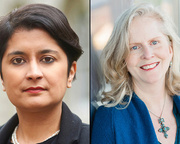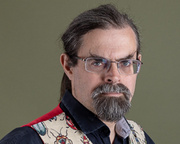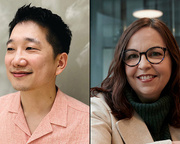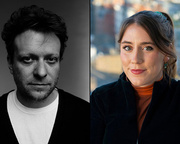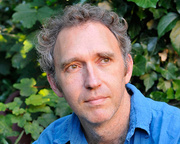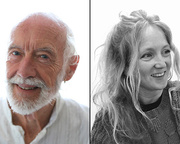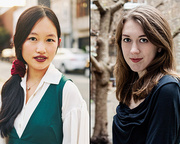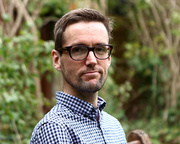Future Tense

The world can feel as though it is in turmoil, from global conflict and environmental disasters to stalled politics and social unrest. From the domestic to the global, challenges can feel relentless and intractable. Short election cycles and a hyper focus on the next sound bite or Insta Reel, telescope and narrow our perspective.
But what happens if we zoom out, and think more expansively? How does our perspective change and our ideas become bolder and further reaching when we think on a much longer time scale altogether?
Future Tense is the foremost of our programme themes this year, bringing together a range of events and topics which offer the option of a truly different way of looking at things. As we relaunch our Festival at the Edinburgh Futures Institute (EFI), we’re joined by some of the brightest minds currently exploring how looking to the future might save us from the present. Are there tensions in the future? Of course: but there’s hope and opportunity too.
Across six elements, we explore how future-oriented thinking, learning across generations and disciplines, and approaching change with curiosity, compassion and imagination, could help us untangle the huge systematic challenges we currently face, both as individuals and as a society. We’ll be looking at some of the most game-changing ideas emerging from technology, economics, philosophy, literature and creativity, and the new thinking which brings these fields together in surprising and impactful ways. From AI to sustainability, new takes on capitalism, history and the green economy, together we’ll have nuanced and progressive discussions that both illuminate the biggest challenges of our time, and suggest ways forward.
1. A Toast to the Future
For the first time, we’ll open with a special Gala event of readings, bringing you a kaleidoscope of perspectives and provocations, from the hopeful to the momentous, as we ask a diverse line-up of stellar writers to explore the idea of The Future (in 7 minutes each). Be inspired, challenged, and delighted by experimental author Martin MacInnes (In Ascension); EFI’s Chair in the Ethics of Data and AI, Shannon Vallor; form-bending writer Irenosen Okojie; speculative novelist Naomi Alderman; national treasure Richard Holloway; and award-winning poet and performer Joelle Taylor. This event will ignite your curiosity and plant the seeds of enquiry which we hope will germinate for you across your time at the Festival as you explore our ideas and themes. Supported by Claire and Mark Urquhart.
2. Future Library
The Future Library project is a meditation on time, and the imagination. A writer creates a work every year for 100 years from 2014, which is placed inside the Future Library in Oslo, remaining unread until 2114. Literary superstar Margaret Atwood contributed the first book to this visionary project, designed by Scottish artist Katie Paterson. Recently, Atwood has been developing the concept of the ‘Practical Utopia’, asking simple questions to push us to completely redesign how we live. She joins us by livestream to explore how we can engender a better future. There will also be hands-on workshops, and the announcement of the 2025 Future Library contributor, to celebrate the 10th anniversary of the project.
3. Generations
We can only plan effectively for the future by understanding what came before, and examining the impact of current decision making beyond the visible horizon. Generations will offer perspectives on how we can become ‘good ancestors’, from Roman Krznaric and Ella Saltmarshe, and on how our political systems can be adapted to consider more deeply our impact on the generations after us (led by Wales’ first Commissioner for Future Generations, Sophie Howe). We’ve crafted a fascinating series of intergenerational conversations between writers who share common ground too – don’t miss, for instance, poets Roger McGough and Hollie McNish together.
4. AI, Data and Complex Systems
We’re at the precipice of a huge change in our relationship with, and trust in, technology. There’s no resisting the shifting tide, but there are vast differences in perceptions about its benefits and dangers. We’ll bring together experts on data to consider how tech can help us build a better world, and where we need to be most wary. We have embarked on some groundbreaking research of our own into how writers and publishers might wrestle some agency back from AI, led by researcher and University of Edinburgh Chancellor’s Fellow Pip Thornton; come and hear the fruits of our fascinating workshops, and try out our Writer vs AI installations.
5. Future Economics and Politics
How is capitalism changing? How are we going to finance the green tech revolution we need? With a more unequal world than ever before, how much wealth is too much? As capital changes hands between generations, and tech looks set to revolutionise the economy, a range of fascinating economic thinkers and journalists grapple with what comes next. Including Nobel Prize winner Joseph E Stiglitz, BBC’s chief economics editor Dharshini David on the green economy, Ken Costa, Grace Blakeley, Ingrid Robeyns, and more.
6. The Imaginative Realm
If some of us have only just begun to think ahead creatively, sci-fi writers and authors of speculative fiction have been imagining the future – or rather, futures – for decades. What alternative universes have they been creating? What can great storytelling reveal to us about ourselves? First class writers from across these genres, including R F Kuang, Adrian Tchaikovsky, and Irenosen Okojie discuss their imagined worlds, a group of writers and scientists get together to explore truly living within our means (like astronauts!)
- Attend in person
- Watch online
- Attend in person
- Watch online
Anton Hur & Shannon Vallor: The Unexpected Consequences of Progress
Wednesday 14 August 11:00 - 12:00
- Attend in person
- Captioned
- Attend in person
- Watch online
- Captioned
- Attend in person
- Attend in person
- Watch online
- Attend in person
- Attend in person
- Captioned
What's on
Find Events
Latest News
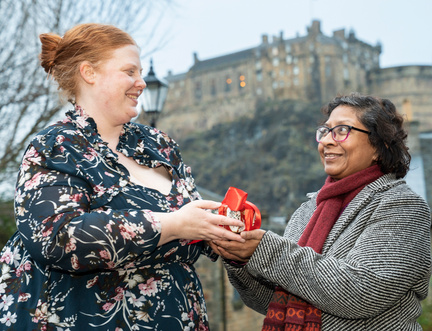 Communities Programme participants celebrate success of 2024
Communities Programme participants celebrate success of 2024

